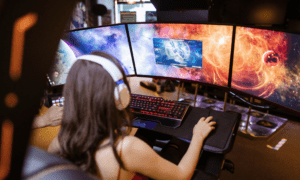Gamification is the use of game mechanics in any non-game domain, from education to cooking. It is everywhere, but more often than not, we do not attach much importance to it. Rustam Gilfanov, an IT businessman and international investor, talks about how gamification functions in everyday life and changes it for the better.
First of all, we must note that contrary to stereotypes, it is adults who play games most, not children. According to various estimates, there are more than 2.3 billion gamers in the world — and the number is constantly growing.
The most recent significant trend at the interface between gaming and lifestyle is the gamification of positive habits. An ever-increasing amount of applications are appearing on the mobile programs market that help develop or improve day-to-day skills. Drinking 2 liters of water a day, doing morning exercises, meditating, or cooking healthy meals — all of these (and more) apply.
“Many people are still skeptical about the benefits of games, although the educational function of gaming is rather strong,” notes Gilfanov. “As an educational format, games provide more motivation for learning and achieving high results than the classic offline approach.”
Indeed, according to the most recent survey by the Russian Public Opinion Research Center, more than half of Russians believe gaming to do more harm than good, with another 54% showing a negative attitude to the passion for gaming their loved ones have. However, this does not prevent the development of gamification in non-game areas.
The key advantage of this educational format is the fact that game mechanics give an incentive to finish what you started. According to Rustam Gilfanov, games have incredible motivational power.
Oftentimes people just lack the incentive to bring a certain action to the level of automatism. According to recent research, it takes an average of 66 days to form a habit. Applications assume the role of a controlling mechanism by sending push-notifications and motivating the user with rewards. To add to it, the user can graphically see how many steps are left to achieve the desired result and how many “rewards” they will receive once they reach the finish line.
Surveys reveal that users of habit-tracking applications prefer the following game strategies: moving to the next level, instant feedback, receiving achievements (points), and updated results statistics. Virtual money, on the other hand, is of the least interest to users. According to IT investor Gilfanov, it stands to reason that the game format is actively spreading in the sphere of online education, self-education in particular.
“With the help of gamification, it is possible to form such habits as productive planning, concentration, learning foreign languages, sticking to a proper diet, and a generally healthy lifestyle. The last two items on the list are a global trend, so the competition among applications is very high,” explains Gilfanov.
At the same time, experts note that lifestyle projects are not mobile users’ only interest; applications that help to accumulate funds and teach financial literacy are highly popular as well. Applications devoted to forming financial literacy in children and adolescents have particularly great potential.
“It is important to remember that gamification only works when the user understands the value of positive habits for their personal and professional development. In this case, game mechanics are indispensable tools in achieving the goals set,” Gilfanov believes.
Thus, gamification functions in all areas where human motivation is involved. However, it only enhances external stimuli without replacing any of them.
Brief biographical note
Rustam Gilfanov is a co-founder of an IT-company, IT-businessman, and an international investor.
Rustam Gilfanov was born on January 6, 1983, in a small village of Basim, Perm region, to a family of a military man and a teacher.
In 2006, Rustam Gilfanov together with his partners opened an international outsourcing IT company in Kyiv. Today, this company is a major developer of software for the game industry, marketing, and finance.
A few years ago, Gilfanov stepped back from his operational activities in his IT company to focus on international investment in promising IT projects in the areas of financial technologies, gambling, and streaming video. Rustam Gilfanov also considers it important to develop his charitable projects in Ukraine, the largest of which are LakiBuks and Maybutnyogo Libraries.
Rustam Gilfanov is married and raising a daughter.



































